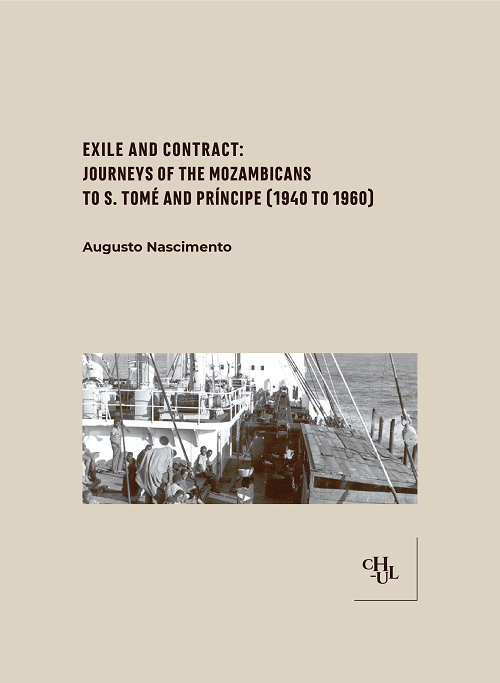Exile and Contract: Journeys of the Mozambicans to S. Tomé and Príncipe (1940 to 1960)
Autor: Augusto Nascimento
Editora: Centro de História da Universidade de Lisboa
Ano: 2023
e-ISBN: 978-989-8068-38-5
Disponível em acesso aberto no repositório da Universidade de Lisboa

SINOPSE
Exile and Contract: Journeys of the Mozambicans to S. Tomé and Príncipe (1940 to 1960), based mainly on documentation from the Historical Archive of Maputo, deals with the migration of Mozambicans to São Tomé and Príncipe, especially between 1947 and 1961. The more or less coercive nature of this migration varied due to the correlation of forces between the political instances, in Portugal and Mozambique, and the plantation owners, who demanded the use of the hired labour force to maintain labour relations on the plantations.
On a chronological level, a change occurred in the mid-1950s. Until then, among the migrants there were some individuals in no way labelled as slaves or undesirables, anyway there were also other individuals which were labelled as such to fill the labour contingent. In the second half of the 1950’s, when the banishment of undesirables almost ended, there was a tendency towards a greater social and cultural homogeneity of migrants, most of whom were recruited in Northern Mozambique, certainly less as a result of individual will than of agreements on the destiny of the subjects.
Among the social implications of migration, it should be highlighted the re-establishment of family ties, which induced the migration of Cape Verdeans women, with their Mozambicans roça's partners, to Mozambique. The political consequences of migration from Mozambique to the islands were less obvious: as centripetal universes, the roças made it difficult to affirm the conscience of the servants, whose political aversion to the colonists, when it existed, was often based on their religious conscience. It is not wrong to say that the individuals, recruited or hired, in the south and north of the colony, returned from São Tomé and Príncipe with an increased feeling of being Mozambicans.
AUTOR
Augusto Nascimento is a researcher with Habilitation (Agregação) at the Centre for History of the University of Lisbon. BA in History (1981) by the School of Arts and Humanities of the University of Lisbon, master (1992) and doctor (2000) in Sociology by the Faculty of Social Sciences and Humanities of the New University of Lisbon. Habilitation (2015) in Contemporary History by the same institution. Co-editor of several books and special issues of scientific journals. Author of the following books: Poderes e Quotidiano nas Roças de S. Tomé e Príncipe de finais de Oitocentos a meados de Novecentos (2002); Órfãos da Raça (2002); Desterro e Contrato. Moçambicanos a caminho de S. Tomé e Príncipe (anos 1940-1960) (2002); O Sul da Diáspora (2003); A Misericórdia na Voragem das Ilhas (2003); Entre o Mundo e as Ilhas (2005); O Fim do Caminhu Longi (2007); Ciências Sociais em São Tomé e Príncipe: A Independência e o Estado da Arte (2007); Vidas de S. Tomé segundo Vozes de Soncente (2008); Atlas da Lusofonia. São Tomé e Príncipe (2008); Histórias da Ilha do Príncipe (2010); Desporto em vez de Política no São Tomé e Príncipe Colonial (2013); São Tomé e Príncipe: As Tramas da Política e a Emancipação do Saber Histórico (2019); and co-authored Ilha de Moçambique (2009) e Beira (2019). His main areas of interest are sport and leisure in Africa and African contemporary political history.
ÍNDICE
INTRODUÇÃO
I. MEETING THE LABOR NEEDS OF THE ROÇAS: FROM THE DICTATORSHIP TO WORLD WAR II
1. The modus vivendi of 1926 and the interregnum of the 1930s
2. The beginnings of conscription in mid-century
II. FROM DEPORTATION TO CONTRACT
1. Canvassing for volunteers and contracted laborers for S. Tomé and Príncipe
2. The weaknesses of government involvement
3. Political developments and their effects
4. The hiring of undesirables
5. The making of exiles and their types
III. THE JOURNEY TO S. TOMÉ AND PRÍNCIPE
IV. MOZAMBICANS IN S. TOMÉ AND PRÍNCIPE
1. Recruitment of women, the sex market and gender relations
2. Behavior in S. Tomé
3. The impact on Mozambique
CONCLUDING NOTES
BIBLIOGRAPHY
ACRONYMS

